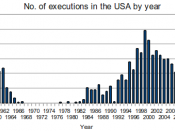Use of the death penalty has declined throughout the industrial Western World since the 19th century. In 1972, a movement in America to have the death penalty declared unconstitutional during the landmark case of Furman v. Georgia, declared the death penalty cruel and unusual punishment. However, after a supreme court decision in 1975, Gregg v. Georgia, which stated capital punishment did not violate the eighth Amendment, executions commenced again under state supervision. (Banner). It has been banned in many countries and in the United States, an earlier move to eliminate capital punishment has now been reversed and more and more states are resorting to capital punishment for serious offenses such as murder. An eye for and eye, a life for a life the Bible mentions it, and people have been using it regularly for centuries. We use it in reference to burglary, adultery, love and many other situations. However, some people use it on a different level, some people use it in reference to death.
One steals from those who have stolen from him, one wrongs those who have wronged him, but do we really have the right to kill those who have killed. Today, there is a big controversy over capital punishment whether or not it works, or if it is morally right. We have a certain privilege on our own lives, but do the lives of others belong to us as well? Do we have the right to decide the kind of lives others can or cannot live? We find someone guilty of murder and sentence him to death, does that not make murderers out of ourselves? Can justice justify our acts? Those who assist in the death penalty are they not partners in crime? Is the death penalty a "Cruel and Unusual" punishment or is it...


